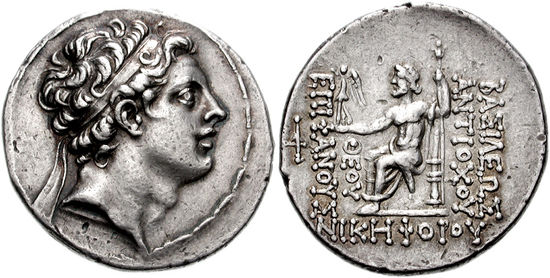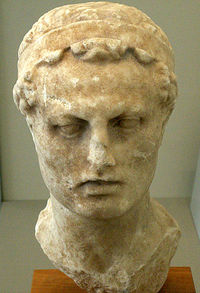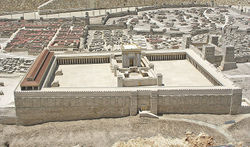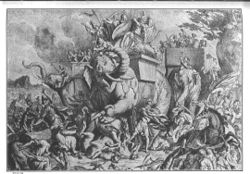Category:Antiochus IV Epiphanes (subject)
|
Antiochus IV Epiphanes
Antiochus IV Epiphanes -- Overview Antiochus IV was the son of Antiochus III the Great and Laodice III, and the younger brother of Seleucus IV Philopator. He was married with Laodice IV; among his children are Antiochus V Eupator (who succeeded his father in 164 BCE), and Laodice VI. Alexander Balas claimed to be his son. With the Peace of Apamea in 188 BCE, following the defeat of Magnesia, the young Antiochus IV was sent as hostage to Rome. The year after Antiochus' older brother Seleucus IV Philopator succeeded Antiochus III the Great, who had died in a skirmish at the temple of Baal at Susa. In 178 BCE Antiochus IV was replaced as hostage by his nephew (and Seleucus IV's son) Demetrius I Soter, and could go back to Antioch. When in 175 BCE Seleucus IV Philopator was killed in a conspiracy by his official Heliodorus, Antiochus IV avenged his brother but claimed the throne for himself, leaving Demetrius I Soter hostage at Rome. In the years 170-168 Antiochus IV successfully repelled an attack by the Ptolomies but Roman pressure forced him to retire from Alexandria of Egypt. In 164 BCE Antiochus died in a failed attack on Susa and was succeeded by his child son Antiochus V Eupator with Lysia as regent. Antiochus IV and the Jews One of the first acts of government of Antiochus IV was the appointment of Jason as the new High Priest at Jerusalem, in place of his brother Onias III. Jason promised to give the king some money from the treasure of the Temple, which Antiochus IV desperately needed. A few years later in 171 BCE, Jason also fell victim of the same scheme. He was deposed and replaced by another High Priest Menelaus, who was not from the House of Zadok, but promised Antiochus IV an even greater amount of money. The contemporaneous presence of three persons claiming the high priesthood created an explosive situation in Jerusalem and an endless series of conflicts that culminated with the exile and death of Jason and the assassination of Onias III by Menelaus in 170 BCE. A major rebellion happened in Judea in the years 167-164 BCE. Antiochus IV intended to secure the border with Egypt and purge Jerusalem from any Ptolemaic influence. His attempt to strengthen the philo-Seleucid party of Menelaus against the philo-Ptolemaic party of Onias IV by abolishing the Zadokite laws resulted in a dramatic showdown with the nationalistic movement of the Maccabees, who emerged as the true winners of the conflict. Onias IV fled to Egypt; Menelaus had to compromise at Jerusalem with the rebels' leader Judas Maccabeus and allow the rededication of the Temple in 164 BCE. Related categories References
External links
Ancient Sources |
Highlights
|
Pages in category "Antiochus IV Epiphanes (subject)"
The following 5 pages are in this category, out of 5 total.
1
- Antiochus; ou, Les Machabées (1722 Nadal), play
- Antiochus der wütente Tyrann, und Vorbild des künftigen Antichrist (Antiochus the Raging Tyrant and Figure of the Future Antichrist / 1762 Werner), oratorio
- Antioco (Antiochus / 1787 Gabellone), oratorio
- The History of Antiochus Epiphanes; or, The Institution of the Feast of Dedication (1866 Rajpurkar), book
- Die Politik Antiochos' des IV (1943 Jansen), book



